人教版七年级下册英语短语及句型总结
- 格式:docx
- 大小:54.81 KB
- 文档页数:14
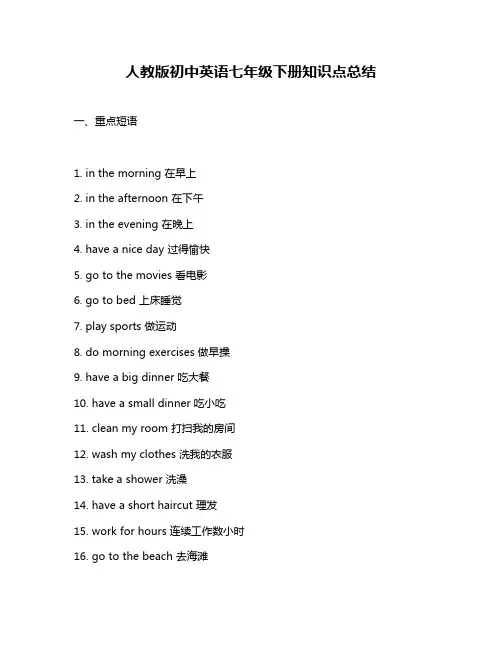
人教版初中英语七年级下册知识点总结一、重点短语1. in the morning 在早上2. in the afternoon 在下午3. in the evening 在晚上4. have a nice day 过得愉快5. go to the movies 看电影6. go to bed 上床睡觉7. play sports 做运动8. do morning exercises 做早操9. have a big dinner 吃大餐10. have a small dinner 吃小吃11. clean my room 打扫我的房间12. wash my clothes 洗我的衣服13. take a shower 洗澡14. have a short haircut 理发15. work for hours 连续工作数小时16. go to the beach 去海滩17. on the weekend 在周末18. listen to music 听音乐19. have a party 举办聚会20. watch TV 看电视21. play computer games 玩电脑游戏22. in the pool 在游泳池里23. go to the zoo 去动物园24. in the mountains 在山里25. have fun 玩得开心26. the great wall 长城27. many places of interest 名胜古迹28. be ready for 为……准备好29. stay healthy 保持健康30. how much 多少31. would you like 一些……吗?32. some noodles 一些面条33. order a pizza 定一个披萨饼34. make a phone order 电话订购35. would you like to do sth 你愿意做某事吗?36. want to do sth 想做某事37. would you like +名词你愿意要……吗?38. would you like +动词不定式你愿意……吗?39. choose some food 选择一些食物40. order the food 订购食物41. be careful 当心;小心42. not much 不多;少量的43. be ready to do sth 准备好做某事。

1—7重点短语1 弹吉他2 下棋3 说英语4 想做某事5 加入音乐俱乐部6 擅长7 讲故事 8 讲故事俱乐部9 喜欢做某事 10 跟某人谈话11. 把某物展示给某人12 和某人相处得好,善于和打交道13 和某人交朋友 14 在周末15. 帮助某人做某事 16. 在某方面帮助某人17. 说英语的学生 18. 弹钢琴19 拉小提琴 20 需要某人做某事21. 教某人做某事 22. 起床;站起23 穿上衣服 24 洗淋浴25.份有趣的工作 26 要么要么; 或者或者27 大量; 许多 28 刷牙29 做某事迟到 30 在周末31 在上学日 32 起得早/晚33 上床睡觉 34 做作业35. 做锻炼 36. 散步37 吃顿丰盛的早餐38 有时间做某事 39 尝起来好40. 一个不健康的习惯 .41. 长达半个小时 42. 到达学校43 到家/到那儿 44 乘火车45 乘飞机/轮船/小船 46 乘地铁47 乘小汽车 48。
骑自行车49 105 50 做某事花费某人时间51 步行去 52 20053.好的锻炼 54. 成百上千的/数以百计的55.坐父亲的车 56. 你觉得怎么样57 需要十分钟的时间到达学校58.过河 59. 乘索道60 10分钟的路 61 坐索道穿过河62. 实现 ` 63. 一个11岁大的男孩64. 像父亲一样对我 65. 为…而感谢66.害怕做某事害怕某物67.迟到 68. 准时69. 听音乐 70. 保持安静71 练习弹吉他 72 考虑做某事73. 把脏盘子留在厨房里把某物落下某地74. 上学日在上学的晚上75.制定规则遵守规则违反规则76 看望朋友 77 留短发78 做某事很开心 79 对某人来说做某事重要的80 对某人严格 81 对某事严格82 记得要做某事 83 记得做过某事84 太多规则 85 太多家庭作业86 太胖 87 学习 /学会做某事88 坚持做某事89 真的吓人91 南非93 用两条腿走路95 整日97 黑白相间的99 来自泰国的学生101 泰国的象征之103 走很长时间105 有食物和水的地方107 处在极大的危险之中109 砍倒树木111 为象牙杀害大象113 由象牙制成的物品115 睡觉117 八小时的睡眠118 忘记要做某事120 种122 各种各样的124 看报纸126. 使用电脑128 出去吃饭130 做汤132 听光盘134 给某人读故事136 和某人起住90。
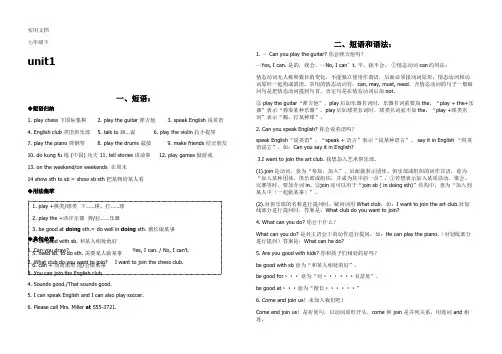
七年级下unit1一、短语:◆短语归纳1. play chess 下国际象棋2. play the guitar 弹吉他3. speak English 说英语4. English club 英语俱乐部5. talk to 跟…说6. play the violin 拉小提琴7. play the piano 弹钢琴8. play the drums 敲鼓9. make friends 结交朋友10. do kung fu 练 (中国) 功夫 11. tell stories 讲故事 12. play games 做游戏13. on the weekend/on weekends 在周末14 show sth to sb = show sb sth 把某物给某人看◆用法集萃◆典句必背1. Can you draw? Yes, I can. / No, I can’t.2. What club do you want to join? I want to join the chess club.3. You can join the English club.4. Sounds good./That sounds good.5. I can speak English and I can also play soccer.6. Please call Mrs. Miller at 555-3721.二、短语和语法:1. — Can you play the guitar? 你会弹吉他吗?—Yes, I can. 是的,我会。
—No, I can’t. 不,我不会。
①情态动词can的用法:情态动词无人称和数目的变化,不能独立使用作谓语,后面必须接动词原形,情态动词和动词原形一起构成谓语。
常用的情态动词有:can, may, must, need。
含情态动词的句子一般疑问句是把情态动词提到句首,否定句是在情态动词后加not。
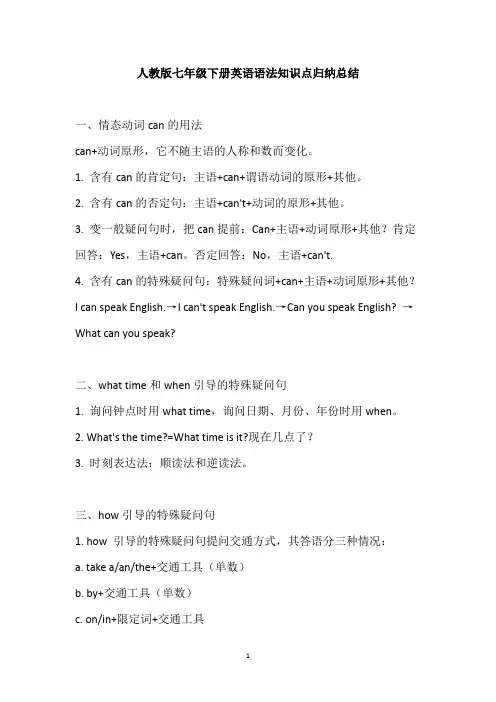
人教版七年级下册英语语法知识点归纳总结一、情态动词can的用法can+动词原形,它不随主语的人称和数而变化。
1. 含有can的肯定句:主语+can+谓语动词的原形+其他。
2. 含有can的否定句:主语+can't+动词的原形+其他。
3. 变一般疑问句时,把can提前:Can+主语+动词原形+其他?肯定回答:Yes,主语+can。
否定回答:No,主语+can't.4. 含有can的特殊疑问句:特殊疑问词+can+主语+动词原形+其他?I can speak English.→I can't speak English.→Can you speak English? →What can you speak?二、what time和when引导的特殊疑问句1. 询问钟点时用what time,询问日期、月份、年份时用when。
2. What's the time?=What time is it?现在几点了?3. 时刻表达法:顺读法和逆读法。
三、how引导的特殊疑问句1. how 引导的特殊疑问句提问交通方式,其答语分三种情况:a. take a/an/the+交通工具(单数)b. by+交通工具(单数)c. on/in+限定词+交通工具---How do you go to school every day?---I take a bus to go to school every day./I go to school by bus every day./I go to school on the bus every day.2. how far 用来提问距离,多远,其答语分为两种:(1)用长度单位表示:It is five kilometers.(2)用时间表示:It’s twenty minutes’walk.3. how long 用来提问时间,意为多久回答常用“for+段时”。
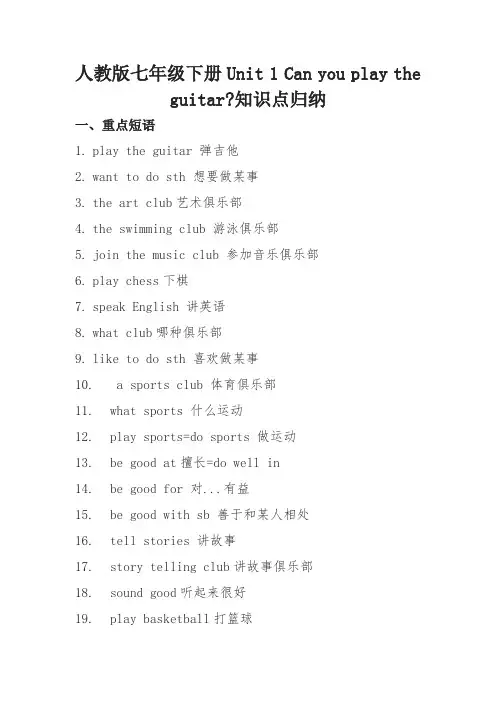
人教版七年级下册Unit 1 Can you play theguitar?知识点归纳一、重点短语1.play the guitar 弹吉他2.want to do sth 想要做某事3.the art club艺术俱乐部4.the swimming club 游泳俱乐部5.join the music club 参加音乐俱乐部6.play chess下棋7.speak English 讲英语8.what club哪种俱乐部9.like to do sth 喜欢做某事10. a sports club 体育俱乐部11.what sports 什么运动12.play sports=do sports 做运动13.be good at擅长=do well in14.be good for 对...有益15.be good with sb 善于和某人相处16.tell stories 讲故事17.story telling club讲故事俱乐部18.sound good听起来很好19.play basketball打篮球20.play tennis 打网球21.play soccer 踢足球22.play volleyball打排球23.write stories 写故事24.students wanted 招聘学生25.school show 学校演出26.talk to sb和某人说27.talk with sb 和某人交谈28.after school 放学后29.do kongfu 表演功夫30.the sound of...的声音31.play the violin 演奏小提琴32.play the drums打鼓33.play the piano弹钢琴34.play pingpong 打乒乓球35.play games with sb 和某人做游戏36.be in the school music club 在学校音乐俱乐部37.help sb (to) do sth 帮助某人做某事38.help sb with sth 在某方面帮助某人39.with the help of 在某人的帮助下40.need sth需要某物41.need sb to do sth 需要某人做某事42.the old people’s home 敬老院43.be free=have time 有时间44.in July 在七月45.tell sb sth=tell sth to sb46.make friends =make a friend47.call sb at+ 号码给某人打48.be busy doing sth 忙于做某事49.be busy with sth 忙于某事50.Englishspeaking students 讲英语的学生51.have time to do sth 有时间做某事52.on the weekend 在周末53.teach music 教音乐54.teach sb sth 教某人某物55.school concert 学校音乐会二、重点句式1.Can you play the guitar?Yes, I can.\No,I can’t.2.I want to join the art club.3.What club do you want to join?4.What sports can you play?5.You are very good at telling stories.6.Can you sing or dance?7.You can be in our school music festival.三、知识点归纳1.can 情态动词,无人称和数的变化can +do一般疑问句把can 提前,回答也用can2.play +the +乐器play + 球类/棋类3.draw 动词,同义词paint4.want to do sth 想要做某事=would like to do sth5.what club 哪种俱乐部,类似用法what color/What sports6.what about=how about+doing...怎么样?表示提建议类似用法:Shall we+do?Let’s do sth.Why not +do?=Why don’t you +do?7.be good at 擅长=do well in =be strong in doing8.sound 感官动词,听起开,后加形容词其他感官动词:look 看起来taste 尝起来smell闻起来feel 感觉起来9.Can you sing or dance? 选择疑问句,通常选其中一个回答,也可以都喜欢或都不喜欢。
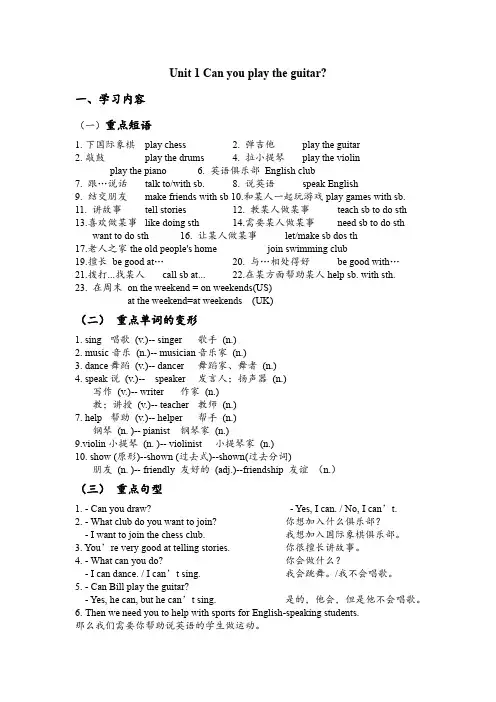
Unit 1 Can you play the guitar?一、学习内容(一)重点短语1.下国际象棋play chess2. 弹吉他play the guitar2.敲鼓play the drums 4. 拉小提琴play the violinplay the piano 6. 英语俱乐部English club7. 跟…说话talk to/with sb. 8. 说英语speak English9. 结交朋友make friends with sb 10.和某人一起玩游戏play games with sb. 11. 讲故事tell stories 12. 教某人做某事teach sb to do sth 13.喜欢做某事like doing sth14.需要某人做某事need sb to do sthwant to do sth16. 让某人做某事let/make sb dos th17.老人之家the old people's home join swimming club19.擅长be good at…20. 与…相处得好be good with…21.拨打...找某人call sb at...22.在某方面帮助某人help sb. with sth.23. 在周末on the weekend = on weekends(US)at the weekend=at weekends (UK)(二)重点单词的变形1. sing唱歌(v.)-- singer 歌手(n.)2. music音乐(n.)-- musician音乐家(n.)3. dance舞蹈(v.)-- dancer 舞蹈家、舞者(n.)4. speak说(v.)--speaker 发言人;扬声器(n.)写作(v.)-- writer 作家(n.)教;讲授(v.)-- teacher 教师(n.)7. help帮助(v.)-- helper 帮手(n.)钢琴(n. )-- pianist钢琴家(n.)9.violin小提琴(n. )-- violinist小提琴家(n.)10. show (原形)--shown (过去式)--shown(过去分词)朋友(n. )-- friendly友好的(adj.)--friendship 友谊(n.)(三)重点句型1. - Can you draw? - Yes, I can. / No, I can’t.2. - What club do you want to join?你想加入什么俱乐部?- I want to join the chess club. 我想加入国际象棋俱乐部。
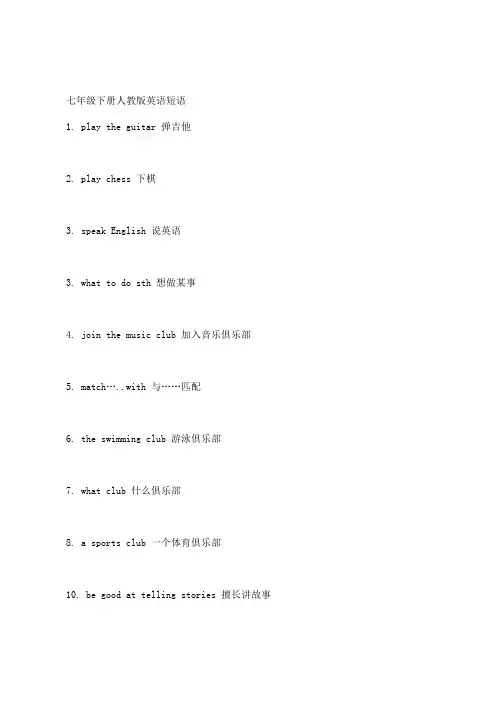
七年级下册人教版英语短语1. play the guitar 弹吉他2. play chess 下棋3. speak English 说英语3. what to do sth 想做某事4. join the music club 加入音乐俱乐部5. match…..with 与……匹配6. the swimming club 游泳俱乐部7. what club 什么俱乐部8. a sports club 一个体育俱乐部10. be good at telling stories 擅长讲故事11. the story telling club 讲故事俱乐部12. like to do/doing sth 喜欢做某事13. let’s join 让我们加入14. sounds good 听起来不错15. students wanted for School Show 学校表演招聘学生16. talk to /with sb 跟某人谈话17. after school 放学后18. do kung fu 表演功夫;练功夫19. show sb. sth.=show sth. to sb. 把某物展示给某人20. play games with people 和人们做游戏21.be in the school music club 在学校音乐俱乐部22. help for old people 对老人的帮助23. be good with…和某人相处得好,善于和..打交道24. be free / be busy 空闲的/忙的25. in July 在六月份26. tell sb. stories 给某人讲故事27. make friends with…和某人交朋友28. call sb. at ……给某人打电话……29. on the weekend 在周末30. help sb.(to) do sth. 帮助某人做某事31. help sb. with sth. 在某方面帮助某人32. English-speaking students 说英语的学生33. It is+adj +(for sb) to sth. 做某事(对于某人来说)是…..34. play the piano 弹钢琴35. play the violin 拉小提琴36. the Students’ Sports Center 学生运动中心37. need help to teach music 需要帮助来做某事38. need sb. to do sth 需要某人做某事39. teach sb. to do sth 教某人做某事40. be in our school music festival 参加我们学校的音乐节。
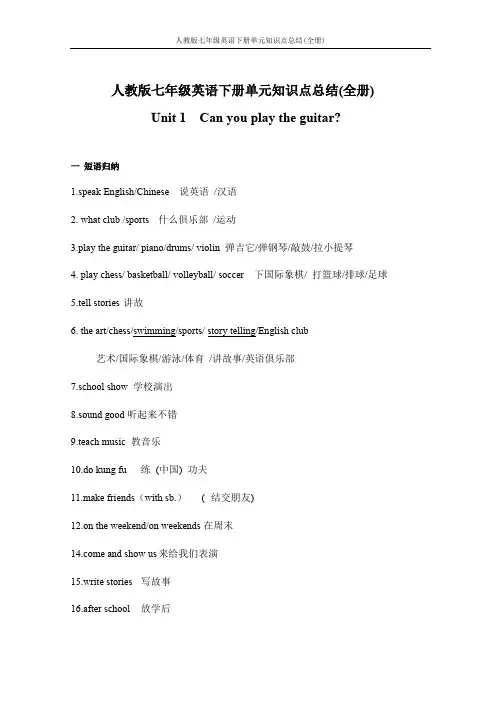
人教版七年级英语下册单元知识点总结(全册)Unit 1 Can you play the guitar?一短语归纳1.speak English/Chinese 说英语/汉语2. what club /sports什么俱乐部/运动3.play the guitar/ piano/drums/ violin 弹吉它/弹钢琴/敲鼓/拉小提琴4. play chess/ basketball/ volleyball/ soccer 下国际象棋/ 打篮球/排球/足球5.tell stories讲故6. the art/chess/swimming/sports/ story telling/English club艺术/国际象棋/游泳/体育/讲故事/英语俱乐部7.school show 学校演出8.sound good听起来不错9.teach music 教音乐10.do kung fu练(中国) 功夫11.make friends(with sb.)(结交朋友)12.on the weekend/on weekends在周末e and show us来给我们表演15.write stories写故事16.after school放学后17.English-speaking students说英语的学生18.play games 做游戏19.the Students’ Sports Center学生运动中心20.at the old people’s home在老人之家21.be in our school music festival 参加学校音乐节22.jion the music club加入音乐俱乐部二用法集萃1. play +棋类/球类下……棋,打……球2. play the +乐器弹/拉……乐器3. be good at doing sth.擅长做某事be good for.. 对… 有好处be good /kind to … 对… 友好4. be good with sb. 和某人相处地好; 善于应付(处理)…5. need(sb./sth.)to do… 需要(某人/某物)做….6. can + 动词原形能/会做某事7. a little + 不可数名词: 一点儿……9. like to do sth.或like doing sth. 喜欢做某事10.want to do…想做……11.What about…?…怎么样?(后面接Ving/代词/名词)12. talk用法: talk to/with sb. 跟某人说话talk about sth. 谈论某事tell 用法:tell sb sth. 告诉某人某事tell sb to do sth 告诉某人去做某事tell stories 讲故事say用法:say直接加说话的内容/itspeak用法:speak +语言13.help sb. with sth在某方面帮助某人= help sb.(to)do sth14.be free /busy有空/很忙15. call sb. at+号码拨打某人的……号码16. be in=join …成为…中的一员(P6)17.want …for the school show为学校表演招聘……三典句必背1. Can you draw? 你会画画吗?Yes, I can. / No, I can’t.是,我会。
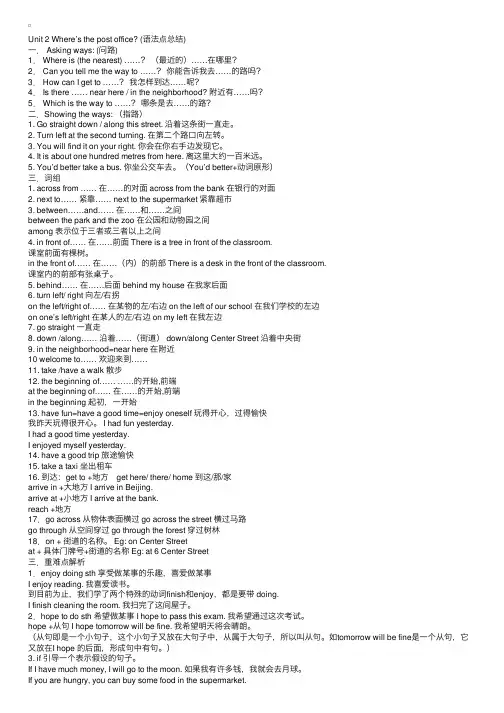
Unit 2 Where’s the post office? (语法点总结)⼀. Asking ways: (问路)1. Where is (the nearest) ……?(最近的)……在哪⾥?2. Can you tell me the way to ……?你能告诉我去……的路吗?3. How can I get to ……?我怎样到达……呢?4. Is there …… near here / in the neighborhood? 附近有……吗?5. Which is the way to ……?哪条是去……的路?⼆.Showing the ways: (指路)1. Go straight down / along this street. 沿着这条街⼀直⾛。
2. Turn left at the second turning. 在第⼆个路⼝向左转。
3. You will find it on your right. 你会在你右⼿边发现它。
4. It is about one hundred metres from here. 离这⾥⼤约⼀百⽶远。
5. You’d better take a bus. 你坐公交车去。
(You’d better+动词原形)三.词组1. across from …… 在……的对⾯ across from the bank 在银⾏的对⾯2. next to…… 紧靠…… next to the supermarket 紧靠超市3. between……and…… 在……和……之间between the park and the zoo 在公园和动物园之间among 表⽰位于三者或三者以上之间4. in front of…… 在……前⾯ There is a tree in front of the classroom.课室前⾯有棵树。
in the front of…… 在……(内)的前部 There is a desk in the front of the classroom.课室内的前部有张桌⼦。
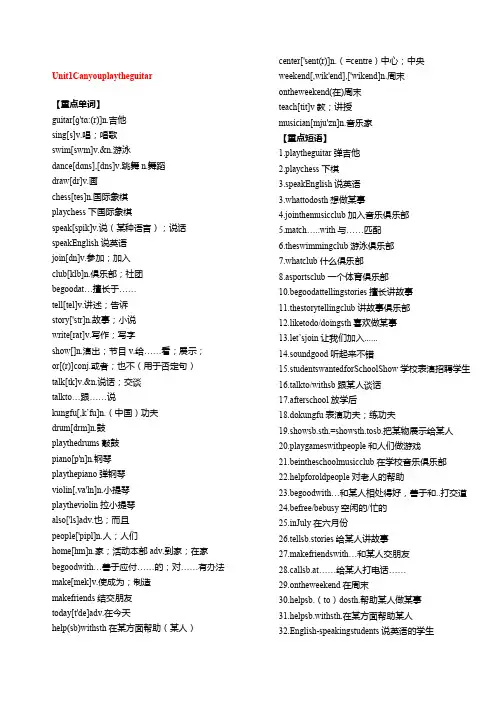
Unit1Canyouplaytheguitar【重点单词】guitar[ɡ'tɑ:(r)]n.吉他sing[s]v.唱;唱歌swim[swm]v.&n.游泳dance[dɑns],[dns]v.跳舞n.舞蹈draw[dr]v.画chess[tes]n.国际象棋playchess下国际象棋speak[spik]v.说(某种语言);说话speakEnglish说英语join[dn]v.参加;加入club[klb]n.俱乐部;社团begoodat…擅长于……tell[tel]v.讲述;告诉story['str]n.故事;小说write[rat]v.写作;写字show[]n.演出;节目v.给……看;展示;or[(r)]conj.或者;也不(用于否定句)talk[tk]v.&n.说话;交谈talkto…跟……说kungfu[,k’fu]n.(中国)功夫drum[drm]n.鼓playthedrums敲鼓piano[p'n]n.钢琴playthepiano弹钢琴violin[,va'ln]n.小提琴playtheviolin拉小提琴also['ls]adv.也;而且people['pipl]n.人;人们home[hm]n.家;活动本部adv.到家;在家begoodwith…善于应付……的;对……有办法make[mek]v.使成为;制造makefriends结交朋友today[t'de]adv.在今天help(sb)withsth在某方面帮助(某人)center['sent(r)]n.(=centre)中心;中央weekend[,wik'end],['wikend]n.周末ontheweekend(在)周末teach[tit]v教;讲授musician[mju'zn]n.音乐家【重点短语】1.playtheguitar弹吉他2.playchess下棋3.speakEnglish说英语3.whattodosth想做某事4.jointhemusicclub加入音乐俱乐部5.match…..with与……匹配6.theswimmingclub游泳俱乐部7.whatclub什么俱乐部8.asportsclub一个体育俱乐部10.begoodattellingstories擅长讲故事11.thestorytellingclub讲故事俱乐部12.liketodo/doingsth喜欢做某事13.let’sjoin让我们加入......14.soundgood听起来不错15.studentswantedforSchoolShow学校表演招聘学生16.talkto/withsb跟某人谈话17.afterschool放学后18.dokungfu表演功夫;练功夫19.showsb.sth.=showsth.tosb.把某物展示给某人20.playgameswithpeople和人们做游戏21.beintheschoolmusicclub在学校音乐俱乐部22.helpforoldpeople对老人的帮助23.begoodwith…和某人相处得好,善于和..打交道24.befree/bebusy空闲的/忙的25.inJuly在六月份26.tellsb.stories给某人讲故事27.makefriendswith…和某人交朋友28.callsb.at……给某人打电话……29.ontheweekend在周末30.helpsb.(to)dosth.帮助某人做某事31.helpsb.withsth.在某方面帮助某人32.English-speakingstudents说英语的学生33.Itis+adj+(forsb)tosth.做某事(对于某人来说)是…..34.playthepiano弹钢琴35.playtheviolin拉小提琴36.theStudents’SportsCenter学生运动中心37.needhelptoteachmusic需要帮助来做某事38.needsb.todosth需要某人做某事39.teachsb.todosth教某人做某事40.beinourschoolmusicfestival参加我们学校的音乐节【重点句型】1.—Canyouswim你会游泳吗?—No,Ican’t.不,我不会。
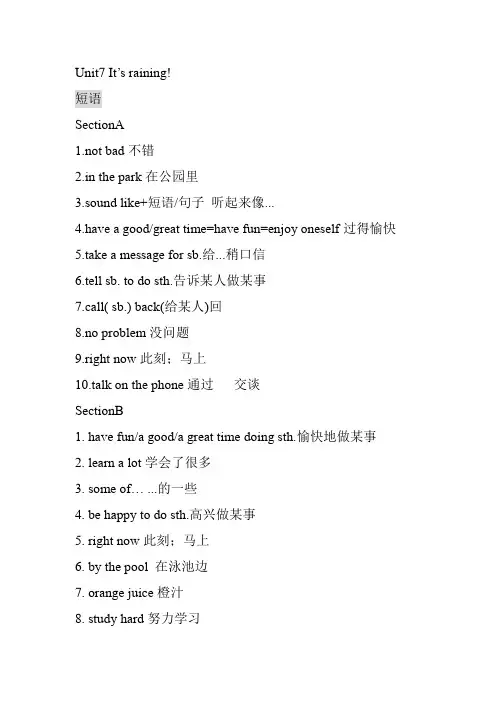
Unit7 It’s raining!短语SectionA1.not bad不错2.in the park在公园里3.sound like+短语/句子听起来像...4.have a good/great time=have fun=enjoy oneself过得愉快5.take a message for sb.给...稍口信6.tell sb. to do sth.告诉某人做某事7.call( sb.) back(给某人)回8.no problem没问题9.right now此刻;马上10.talk on the phone通过交谈SectionB1. have fun/a good/a great time doing sth.愉快地做某事2. learn a lot学会了很多3. some of… ...的一些4. be happy to do sth.高兴做某事5. right now此刻;马上6. by the pool 在泳池边7. orange juice橙汁8. study hard努力学习9. on ( a) vacation度假be on a vacation在度假go on a vacation去度假10. write to sb.给某人写信11. just right for sth./doing sth.正好适合...12. take home带回家13. take a photo of sb./sth.给某人/某物照相14.ask sb.to do sth.要求某人做某事句子SectionA1.How the weather in Beijing?=What’s the weather like in Beijing?北京天气怎么样?2.It’s raining in Bejiing.=It’s rainy in Beijing.=There’s rain in Beijing.北京下雨。
人教版七年级下册英语期末复习知识点总结汇编人教版七年级下册英语期末复知识点总结汇编Unit1 Can you play the guitar?一词形转换1.singv.唱歌singern.歌手singingn.歌唱2.swimv.游泳swimmern.游泳者swimmingn.游泳3.dancev.跳舞XXX.舞者dancingn.跳舞4.drawv.画画drawern.抽屉drawingn.图画5.XXX.说话XXX.发言者XXX发言6.writev.写writern.作家writingn.写作7.XXX.小提琴violinistn.小提琴手8.XXX.钢琴pianistn.钢琴家9.musicn.音乐musiciann.音乐家10.XXX.教XXX.教师二、短语及用法1.play the +西洋乐器play the XXX……play +球类/活动play XXX2.XXX讲英语XXX讲故事talk to/ with sb.和某人交谈 3.be good at + doing XXX擅长做某事=do well in (doing )sthbe good for对……有好处反义:be bad for对……有坏处be good to sb.对……友好= be friendly tobe good with善于应付……的4.make XXX和某人交朋友5.stay at home待在家6.help sb。
with sth/ help sb。
(to )do XXX帮助某人做某事7.on the weekend = on weekends在周末XXX教某人做某事XXX什么俱乐部music XXX XXX10.want to do XXX想要做某事want sb。
to do XXX想要或人做某事11.like to do sth/ doing XXX喜爱做某事12.be free/busy有空/忙碌的13.call sb。
人教版七年级下册英语短语人教版七年级下册英语短语参考内容:1. in front of:在……前面2. at the back of:在……的后面3. on the left/right:在左边/右边4. in the middle of:在中间5. next to:紧挨着,旁边6. near:近,靠近7. across from:在对面8. between…and…:在……和……之间9. in (the) corner:在角落里10. on the floor:在地板上11. on the table/desk:在桌子上12. on the chair:在椅子上13. in the cupboard:在碗柜里14. on the shelf:在书架上15. under the bed/desk/table:在床底/桌子底下16. behind the door:在门后17. above:在……的上方18. below:在……的下方19. over there:在那边20. by the window/door:在窗户/门旁边21. over the bridge:过桥22. up the stairs:上楼23. down the stairs:下楼24. at the crossroads:在十字路口25. on the left/right-hand side:在左/右手边26. on the second floor:在二楼27. go straight ahead:直走28. turn left/right:向左/右转29. take the first/second street on the left/right:向左/右转进入第一/二条街30. a piece of cake:小菜一碟31. How are you doing?:你好吗?32. What do you look like?:你长得什么样?33. What does he/she look like?:他/她长得什么样?34. What does she/he like?:她/他喜欢什么?35. What color is it/are they?:它/它们是什么颜色?36. What’s your favorite food/hobby?:你最喜欢的食物/爱好是什么?37. How far is it from…to…?:从……到……有多远?38. How long does it take to get to…?:到……需要多长时间?39. What’s the weather like today?:今天天气如何?40. What’s the temperature today?:今天气温多少度?41. What would you like?:你想要什么?42. What’s the date today?:今天是几号?43. What’s your favorite subject?:你最喜欢的科目是什么?44. What do you often do on weekends?:你周末经常做什么?。
Unit1 Can you play the guitar【重点单词】guitar [ɡɪ'tɑ:(r)] n. 吉他sing [sɪŋ] v. 唱;唱歌swim [swɪm] v. & n. 游泳dance [dɑːns], [dæns] v. 跳舞 n. 舞蹈draw [drɔː] v. 画chess [tʃes] n. 国际象棋play chess 下国际象棋speak [spiːk] v. 说(某种语言);说话speak English 说英语join [dʒɔɪn] v. 参加;加入club [klʌb] n. 俱乐部;社团be good at… 擅长于……tell [tel ] v. 讲述;告诉story ['stɔːrɪ] n. 故事;小说write [raɪt] v. 写作;写字show [ʃəʊ] n. 演出;节目 v. 给……看;展示;or [ɔː(r)] conj. 或者;也不(用于否定句)talk [tɔːk] v. & n. 说话;交谈talk to … 跟……说kungfu [,kʌŋ’fuː] n.(中国)功夫drum [drʌm] n. 鼓play the drums 敲鼓piano [pɪ'ænəʊ] n. 钢琴play the piano 弹钢琴violin [,vaɪə'lɪn] n. 小提琴play the violin 拉小提琴also ['ɔːlsəʊ] adv. 也;而且people ['piːpl] n. 人;人们home [həʊm] n. 家;活动本部 adv. 到家;在家be good with… 善于应付……的;对……有办法make [meɪk] v. 使成为;制造make friends 结交朋友today [tə'deɪ] adv. 在今天help (sb) with sth 在某方面帮助(某人)center ['sentə(r)] n.(=centre)中心;中央weekend [,wiːk'end], [ 'wiː kend] n. 周末on the weekend (在)周末teach [tiːtʃ ] v教;讲授musician [mjuː'zɪʃn] n. 音乐家【重点短语】1. play the guitar 弹吉他2. play chess 下棋3. speak English 说英语3. what to do sth 想做某事4. join the music club 加入音乐俱乐部5. match…..with 与……匹配6. the swimming club 游泳俱乐部7. what club 什么俱乐部8. a sports club 一个体育俱乐部10. be good at telling stories 擅长讲故事11. the story telling club 讲故事俱乐部12. like to do/doing sth 喜欢做某事13. let’s join 让我们加入......14. sound good 听起来不错15. students wanted for School Show 学校表演招聘学生16. talk to/with sb 跟某人谈话17. after school 放学后18. do kung fu 表演功夫;练功夫19. show sb. sth.=show sth. to sb. 把某物展示给某人20. play games with people 和人们做游戏21.be in the school music club 在学校音乐俱乐部22. help for old people 对老人的帮助23. be good with… 和某人相处得好,善于和..打交道24. be free / be busy 空闲的/忙的25. in July 在六月份26. tell sb. stories 给某人讲故事27. make friends with… 和某人交朋友28. call sb. at …… 给某人打……29. on the weekend 在周末30. help sb.(to)do sth. 帮助某人做某事31. help sb. with sth. 在某方面帮助某人32. English-speaking students 说英语的学生33. It is+adj +(for sb)to sth. 做某事(对于某人来说)是…..34. play the piano 弹钢琴35. play the violin 拉小提琴36. t he Students’ Sports Center学生运动中心37. need help to teach music 需要帮助来做某事38. need sb. to do sth 需要某人做某事39. teach sb. to do sth 教某人做某事40. be in our school music festival 参加我们学校的音乐节【重点句型】1. —Can you swim你会游泳吗?—No,I can’t.不,我不会。
人教版英语七年级下册第1-2单元写作常用短语、句子积累第一单元:Unit 1 Can you play the guitar?话题:谈论个人能力、参加俱乐部。
1、可能用到的单词归纳:dance跳舞;sing唱歌;swim游泳;draw画画;write写作;tell讲述;talk说话;speak 说语言;join参加、加入;drum鼓;piano钢琴;violin小提琴;guitar吉他;musician 音乐家。
注意:dance-dancing ;swim-swimming;write-writing ;drum-drums2、可能用到的短语归纳:speak English说英语;play chess下国际象棋;play the guitar \ violin \ drums \ piano弹吉它\拉小提琴\敲鼓\弹钢琴;be good at..擅长;be good with…善于应对…、对…有办法;talk to\with…与…交谈;help sb. with sth. 在某方面帮助某人;help sb. do (to do) sth.帮助某人做某事;make friends交朋友;on the weekend \ on weekends在周末注意以下短语的运用:(1)、关于play的用法:与乐器在一起:play the guitar \ violin \ piano\ drums 接乐器的时候,后面要加the其它用法:play chess下国际象棋;play basketball打篮球;play sports做运动(2)、be good at的用法(同义词do well in):在某方面擅长:be good at sth. 例如:I am good at basketball. 我擅长篮球。
擅长做某事:be good at doing sth. 例如:Tom is good at playing basketball. = Tom does well in playing basketball. 汤姆擅长打篮球。
七年级下册英语重点短语及句型Unit 1 Can you play the guitar?知识点一.重点短语1. play the guitar 弹吉他play the drums 敲鼓play chess 下象棋play the guitar well 弹吉他弹得好2. speak English 说英语speak well fell well tell sb. about sth.告诉某人关于某事tell sb. to do sth.告诉某人做某事tell a story 讲故事say it in English用英语说don’t talk to him 不要和他说话3.want to do sth.=would like todo sth.想要做事4. join the art club 加入艺术俱乐部join.. ..club加入….俱乐部join us /sb加入我们Join them in the computer game 加入他们的电脑组织游戏5. be good with sb.和某人相处的好be good for···对······有益处be good at doing sth. / sth.= do well in doing sth.=do well in sth.···擅长做某事/擅长某事6. help sb. with sth.帮助某人干某事(在某方面帮助某人) help作为名词为不可数名词help sb. to dosth.= help sb.. doing sth. / sth.帮助某人干某事need sb. to dosth.需要某人干某事7. show sth.to sb. = show sb.sth.把某物给某人看show作为名词为可数名词8.be busy with sth. /doing sth.忙于某事/忙于做某事/9.or.多用于疑问句中表示”还是”, 表选择Can you sing or dance?你会唱歌还是会跳舞?or.多用于否定句表示”也不”, I don’t like fish or eggs 我不会鱼也不喜欢鸡蛋.10.good/ well 的用法good 只用作形容词,在be动词后面/ 放在名词前面well一般作副词,放在动词后面his drawing is good 他的画是好的 a good book 一本好的书speak well fell well11.状导练want sb. for ….. 因某事而招收因某事而有求于某人如: We want students for the school show . 因学校演出而招收学生.She wanted him for computer problems. 因计算机问题而有求与他。
12. make friends 交朋友on the weekend在周末every one +三单/后面动词为第三人称单数the Students’ Sports Center 学生运动中心13.Also /too的用法Also用于句中,助动词(do)\be动词(do)\情态动词(can)之后,实义动词前,too用于句末,前面用,隔开14.情态动词can +动词原形回答Yes, I can.或No, I can’t.二.重点句型1. — Can you play the guitar? 你会弹吉他吗?—Yes, I can. 是的,我会。
—No, I can’t. 不,我不会。
2. —What club do you want to join? —I want to join the art club.你想参加什么俱乐部?我想加入艺术俱乐部。
3. What can you do? 你会干什么?4. You’re very good at telling stories. 你非常擅长将故事。
5. Are you good with old people? 你和老人相处的好吗?6. They can tell you stories, and you can make friends.他们可以给你讲故事,你也可以和他们交朋友。
7. Then we need you to help with sports for English-speaking students.那么我们需要你来帮助那些在做运动的讲英语的同学。
8. Can you play the piano, the trumpet, the drums or the guitar?你会弹钢琴、吹喇叭、敲鼓还是会弹吉他?9. Do you have time on the weekend? 你在周末有时间吗?10. Please call Zhang Heng at 622-6033. 请给张恒打电话拨打622-6033。
Unit 2 What time do you go to school?知识点一.重点短语go to bed 上床睡觉go to work 去上班get up 起床get up late/early起床早/晚get dressed 穿上衣服get to 到达区别:go home 回家(强调动作,还没到了) get home 到家(强调状态,已经到了)go to school 去上学(强调动作,还没到了) get to school 到校(强调状态,已经到了)take a shower 洗淋浴takea walk /have a walk散步take a/an +名词从事……活动brush teeth 刷牙on school nights 上学日的晚上what time 什么时间in our group 在我们组healthy habit 好习惯eat /have breakfast 吃早饭for half an hour 持续半小时on the weekend on weekends 在周末in the morning/ afternoon/ evening 在上午/下午/晚上at night /noon在晚上/中午lots of=a lot of /many/ much许多,大量区别记住:many可much不可lots of可不可radio station 广播电台be late for=arrive late for 迟到play computer games 玩电脑游戏put on 穿衣服walk to 走路去drive to开车去from …to …从……到……2.ask sb. to do sth./ ask sb. doing sth.叫某人做某事3.like to do sth./ like doing sth.喜欢做某事3.That tastes good / That looks good / That sounds good. Taste/ look/sound作为半系动词后面+形容词,同be+形容词This is a very interesting book=The book is very interesting这本书是有趣的.4. What about / How about 怎么样+名词/+代词宾格/+动词的ing如:What about / How about this book? What about me /them? What about playing basketball ?5.either…or… 要么…要么…连接2个主语时,谓语动词与最近的主语保持一致,就近原则。
如:Either you or he is right? 单独either,一般用于否定句的句末,表示也不6.life:生活,生命, 作为生命可数名词复数:lives7.乘坐交通工具: take a/the bus=by bus=on bus take a/the car=by car =in carRide one’s bike=bybike =on bike walk to school=go to school on foot步行去上学on the school bus= take the school bus乘坐校车8.区别时表时间的词at + 具体时间点在几点(几分)on + 具体日期在某一天in + 时间段(月份/季节/年等)在某月/某季节/某年9.表时间的past(过)与to (差)的用法时间过半用to ,半及半以内用past如: 六点15: a quarter past six 6点45:a quarter to seven7. need sb. to dosth.需要某人做某事三.重点句型1. —What time do you usually take a shower? 你经常几点洗澡?—I usually take a shower at six forty.我经常六点四十洗澡。
7. I don’t have much time for breakfast, so I usually eat very quickly.我没有很多的时间吃早餐,所以我总是吃得很快。
8. After school, I sometimes play basketball for half an hour. 放学后,我有时候会打半个小时的篮球。
9. In the evening, I either watch TV or play computer games. 在晚上,我要么看电视要么玩电脑游戏。
10. At twelve, she eats lots of fruit and vegetables for lunch. 在十二点吃中餐时,她吃很多的水果和蔬菜。
11. She knows it’s not good for her, but it tastes good. 她知道这对她不好,但是冰激凌真的很美味。
12. I have a very healthy life. 我的生活很健康。
13. Here are your clothes. 给你我的衣服。
Unit 3 How do you get to school?知识点一.重点短语1.take the subway 乘地铁take the train 坐火车leave for 到…地方去;离开去某地think of 想到;想起how far 多远be different from和…不同between t… and在…和…之间leave village 离开村庄be afraid 害怕be like像like/afraid形容词there be(is/are)有some of一些take sb. to school 把某某带去什么地方(学校) bring to 带来How far多远How long多长时间bus station汽车站five years old五岁five- year-old五岁的2. It takes sb.+时间to do sth.花费某人某些时间去做某事如:It takes me half an hour to go to school3.It's easy for sb.to do sth.做某事是很容易的对某人来说=对某人来说做某事是很容易的It's+形容词for sb.to do sth做某事是……的对某人来说如:It is easy for me to do homework。